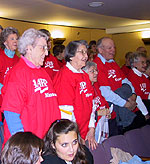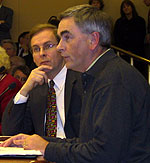'Do Not Call bill' gets committee approval
By Tom Scheck
Minnesota Public Radio
February 6, 2002
A House committee has approved a bill that would prevent telemarketers from calling individuals who put their names on a state-sponsored 'do-not-call' list. Supporters of the measure say telemarketers are inundating residents with too many calls and becoming a nuisance. Opponents argue the bill won't do anything to stop fraudulent telemarketers and will impede businesses that rely on telemarketing.
| |
|
|
|
||
The "Do Not Call" bill has received a big push from AARP, the advocacy group for retired people. Dozens of senior citizens like Bernie Talougan showed up at the House Committee on Commerce, Jobs and Economic Development hearing wearing red t-shirts.
"I just wish something would be done with it," he said. "That's the frustration that I've had, because I get so many of them. I'm from Rochester. It seems like they go in streaks; sometimes I'll get three or four in a day."
The AARP says it supports the bill because telemarketers prey on senior citizens. The group says the bill will decrease unwanted calls and will help lower the number of fraudulent telemarketers.
The proposal, sponsored by Rep. Matt Entenza, DFL-St. Paul, would allow people to put their name on a "do not call list," maintained by the Commerce Department. He says telemarketers would be required to buy the $15 list every three months. Entenza says telemarketers who continue to call those who have asked to be on the list could be fined up to $2,000 for every unwanted call.
"Although I know that some members of the business community have some concerns. I think this actually makes good business sense. Why would we want to call people who don't want to be bothered? Why do we want to call people who don't want to be bugged?" Entenza said.
Entenza's bill would allow for some calls to people on the list. Non-profits and political organizations are constitutionally exempt from the bill. It also doesn't stop companies that do direct business with an individual.
| |
|
|
|
||
For example, the local phone company or long distance carrier will still be able to call as long as the individual has phone service with the company.
Mark Joyce, from MCI WorldCom, says that proposal could harm his company. He says MCI helped lower long distance rates by competing with AT&T and other carriers. He says if local phone deregulation occurs in Minnesota, it could give an unfair advantage to established phone companies.
"I would warn you or caution you, I guess, as we see local competition evolve, if you want to see any movement in market share and want that market to work, phone companies are going to have to have a channel to market their service. Telemarketing will be a crucial piece of that," he said.
Other opponents say there are already plenty of federal and state laws that can stop unwanted telemarketing calls.
Rep. Ron Erhardt, R-Edina, went through a laundry list of ways to remove names from telemarketing lists. "It almost seems like we're doing, we're churning here. We're layering another layer of laws on that perhaps we don't need. I really wonder if this is necessary or I wonder if this is an Entenza endorsement ploy for the next election," he said.
However, others say there's a better way to stop fraudulent and overbearing telemarketers.
St. Paul resident Mike Schumann says the state should force phone companies to establish "automatic call rejection" for consumers. He says the program forces people who have protected or unknown phone numbers into a system that either forces the caller to hang up or punch in their 10-digit number. He says a pre-recorded message tells telemarketers to hang up.
"We don't need another law. We don't need another bureaucracy. We don't need another database. We need to take advantage of the technology tools that we currently have that not only take the legitimate telemarketers and put them on hold but attacks the slimeballs that are really what the problem is that you heard about today," he said.
Schumann's proposal generated some interest among the committee members but would receive heavy opposition from phone companies. Entenza says he'll try to work with Schumann and members of the business community before the bill gets another hearing. The committee approved the bill on a voice vote. It heads next to the House Civil Law Committee.


